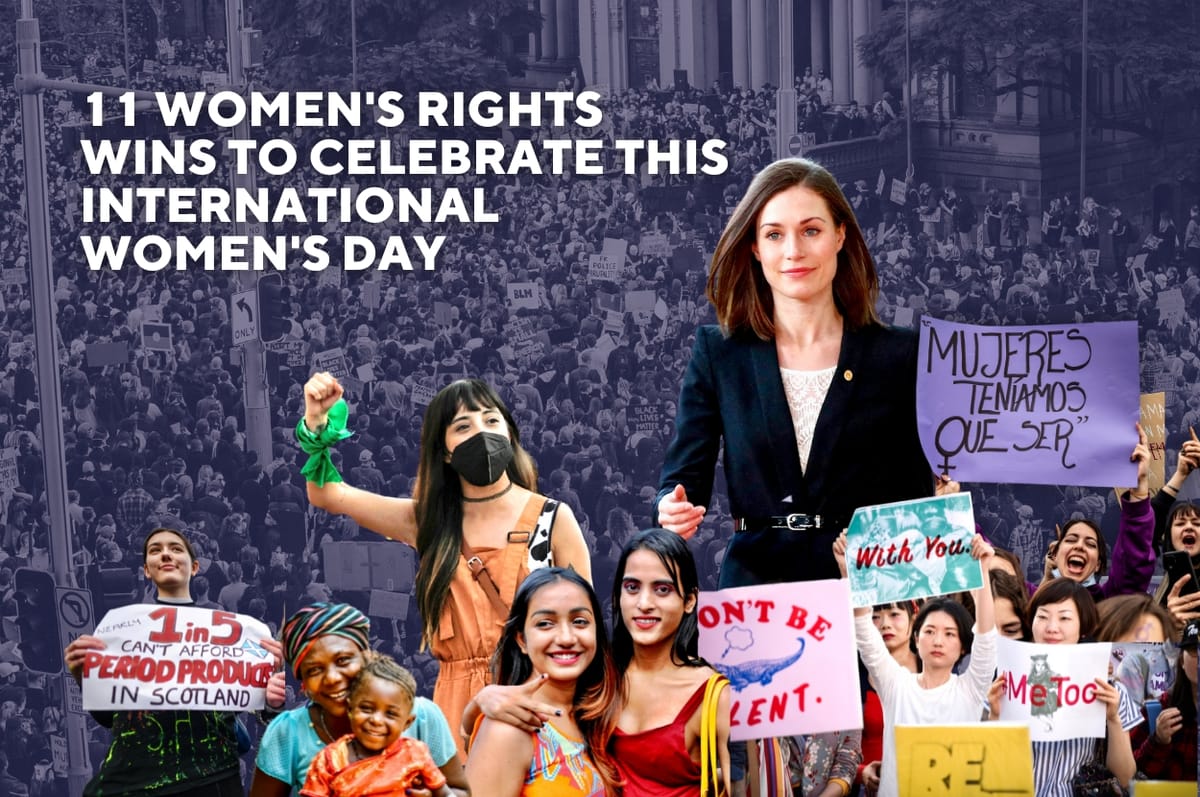11 Women’s Rights Wins To Celebrate This International Women’s Day
Change is possible when we stand up for equality. Happy International Women’s Day!

This International Women’s Day, we’re celebrating the progress made in the fight for gender equality.
From Spain to Sierra Leone, countries around the world have made bold moves to advance women’s rights in the past year.
Change is possible when we stand up for equality. Happy International Women’s Day!
1. Spain Passed A “Only Yes Means Yes” Law That Clearly Defines Rape As Sex Without Consent
Spain’s Congress finally passed a law known as the “only yes means yes” law, which states that lack of sexual consent is sufficient to prove sexual assault.
It comes after a series of court cases in which five men were jailed for sexual abuse, and not rape, after they gang-raped an 18-year-old woman at the running of the bulls festival in Pamplona in 2016.
2. Mexico Will Now Allow Girls Who Have Been Raped To Get An Abortion Without Parental Consent
Mexico’s Supreme Court ruled that all girls can get an abortion without parental consent in cases of rape.
Prior to the ruling on May. 24, only women and girls older than 12 years old could obtain an abortion in cases of rape.
The Supreme Court judge said he hopes the ruling will protect girls who suffer from sexual abuse from family or authorities.
3. Scotland Officially Became The First Country In The World To Make Period Products Free For Everyone
Scotland officially became the first country in the world to make period products free and available for anyone who needs them.
Under the landmark legislation, which lawmakers passed unanimously in November 2020, the Scottish government will collaborate with local authorities to help anyone who needs period products get them free of charge.
This means that people will have the legal right of free access to tampons and sanitary pads in schools, colleges, universities and public buildings, as well as a “reasonable choice of different period products” and the option to have products delivered to them.
4. Japan Is Finally Proposing To Raise The Age Of Sexual Consent From 13 To 16
Japan’s justice ministry proposed raising the country’s age of sexual consent from 13 to 16 as part of a wider reform of the country’s laws on sex crimes.
The proposal also aims make grooming minors and voyeurism a crime, as well as expand the definition of rape.
5. New Zealand Now Has More Women Lawmakers Than Men After Swearing This Māori Woman Politician
For the first time in the country’s history, New Zealand’s parliament now has more women than men.
It comes after Māori woman politician Soraya Peke-Mason was sworn in as a lawmaker for the Labour Party on Tuesday Oct. 25, replacing outgoing speaker Trevor Mallard.
As there is a vacancy in one spot in the 120-seat parliament, there are now 60 women MPs and 59 male MPs.
In her speech after being sworn in, Peke-Mason called it “a significant historic day for Aotearoa New Zealand.”
“There are many firsts today, Mr. Speaker, first in my swearing in, secondly at the same time, we reached for the very first time in the government, gender equity,” Peke-Mason said in her speech after being sworn in.
6. Sierra Leone Passed A New Law Ensuring Women Get Equal Pay And Hold 30% Of Public And Private Jobs
Sierra Leone’s president approved a new law mandating women get equal pay and hold at least 30% of positions in government, as well as decision-making roles in both public and private jobs.
The law extends maternity leave from 12 weeks to 14 weeks and ensures women have equal access to training and credit and financial services.
Under the law, companies will be required to submit an annual report about its gender equality efforts.
Those found violating the law could be fined or even face prison time.
7. After Six Years, Indonesia Finally Passed A Landmark Bill To Eliminate Sexual Violence
After six years of discussions, Indonesia’s parliament finally passed a bill to fight sexual violence.
In a first in the Southeast Asian country, the bill was approved with a majority of votes on Tuesday April 12, 2022.
Under the bill, people who commit physical sexual abuse will be sentenced for up to 12 years in prison, while those who commit sexual exploitation will face up to 15 years in prison.
At the same time, forced marriage, including child marriage, can be criminalized by up to nine years. Circulating non-consensual sexual content is punishable by up to four years.
Convicted abusers must pay reparations to the victims, and authorities must also provide counseling to victims.
8. Finland Changed Its Law So Women No Longer Need To See Two Doctors To Get An Abortion
Finland’s parliament approved a reform to the country’s abortion law that would make it easier for people to get the procedure.
Under the reform, which passed by a large majority of 125-41 on Oct. 26, people can request an abortion up to 12 weeks of a pregnancy with the approval of one doctor, instead of two.
They will also no longer need to provide additional reasons for seeking the procedure such as their social and economic situation.
9. Israel Eased Its Abortion Laws So Women No Longer Have To Ask A Special Committee For Approval
Israel loosened its abortion laws to allow people to get abortion pills through the country’s universal health system and not have to appear in front of a special committee to get approval to terminate a pregnancy.
Under the new rules, to take effect over the next three months, women can undergo abortions at local health clinics instead of only at hospitals or surgical clinics.
They will also no longer need to physically appear before a committee, made up of a social worker and two doctors, to apply for an abortion.
10. Germany Abolished A Nazi-Era Law Banning Doctors From Offering Information About Abortions
Germany abolished a Nazi-era law forbidding doctors from offering information about abortions.
Under the law, which was adopted in 1933, doctors who publicly “offers, announces [or] advertises” abortion services could be jailed for two years or fined, according to the Guardian.
11. India’s Top Court Ruled That Marital Rape Is Rape And Abortion Is Legal For Everyone Up To 24 Weeks
In a landmark ruling, India’s Supreme Court has ruled that marital rape is rape and that everyone has the right to get an abortion up to 24 weeks in a pregnancy, regardless of their marital status.
In India, single women were unable to get an abortion due to a 1971 law that had limited abortions to only married women, divorcees, widows, minors, “disabled and mentally ill women” and survivors of sexual assault or rape, according to Reuters.




